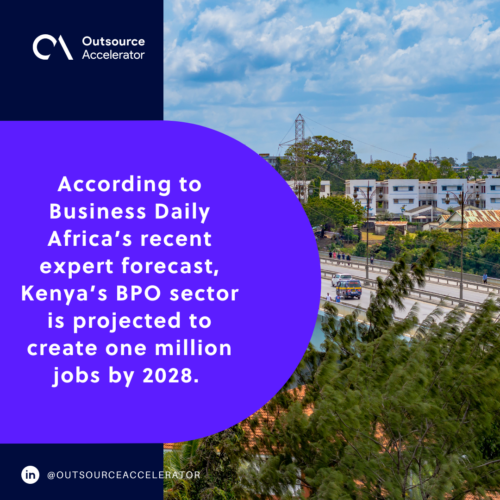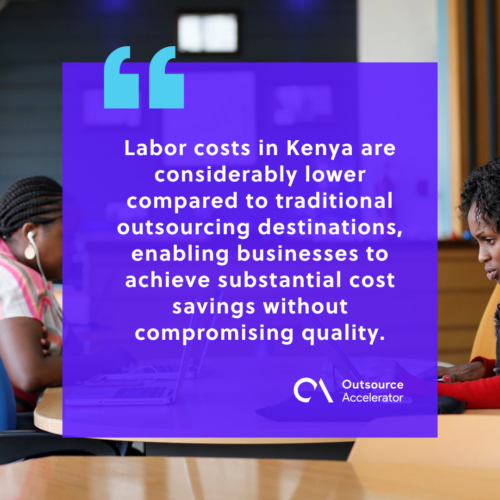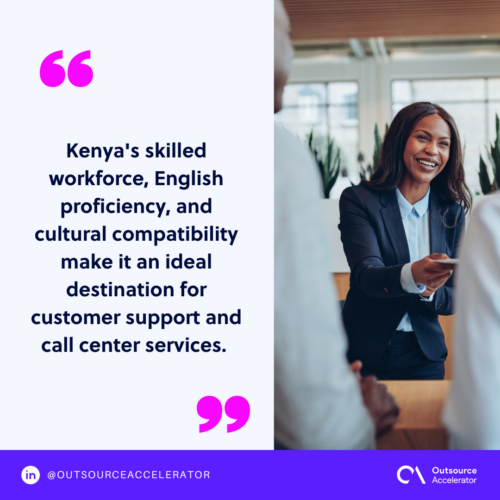Outsourcing to Kenya: A thriving destination for businesses

It’s not news that outsourcing has become a popular solution for businesses looking to cut costs and improve efficiency.
While traditional outsourcing destinations like India and the Philippines have dominated the industry for years, a new player has emerged on the scene – Kenya.
This East African nation is becoming a thriving destination for organizations looking to outsource their operations. In fact, Kenya is considered a major player in the outsourcing industry, along with other African countries like Ghana, South Africa, and Egypt.
So why is Kenya among those leading the pack in the continent when it comes to business process outsourcing (BPO)?
Among plenty of good reasons, the country is showing a rapidly growing offshoring sector with strong, ongoing support from the local government.
It’s no wonder the coastal country is quickly becoming a go-to destination for outsourcing needs.
Learn more about why outsourcing to Kenya can be the right move.
Kenya’s outsourcing sector
Kenya’s outsourcing sector has been steadily growing over the past decade. According to Business Daily Africa’s recent expert forecast, Kenya’s BPO sector is projected to create one million jobs by 2028.
The report states at present, approximately 36,000 jobs in the BPO industry are established through the efforts of intensified branding and the development of a broad range of skills.
The country has a strong pool of educated, young, and skilled workers, with a large population of English-speaking professionals.
Capital Business shared that Tatu City, a special economic zone in the Nairobi Metropolitan region, has been the subject of an international contact center operator’s expansion. This is due to the company’s need for a young and highly-skilled workforce.
With that in mind, Kenya is proving to be an attractive destination for businesses looking for top-notch outsourcing solutions.
Following the COVID-19 pandemic, the country’s BPO industry has aided in job creation, especially for young workers.
Kenya National Bureau of Statistics (KNBS) reports that this has been fueled by increased information and communications technologies (ICT) services and the continuous improvement of related infrastructure.
This remarkable growth is evident in the increase of service agents, customers, and the number and value of transactions between December 2019 and December 2020. Between those years, mobile money agents increased by 26.2% from 224,108 to 282,929.
There’s also been client growth at 13%, from 58.4 million to 66 million during the same period. Meanwhile, transactions grew by 17%, from 155 million to 181.4 million.
The KNBS added that a large tech hub developed by the government called the Konza Technopolis project will broaden the capacity of the nation’s outsourcing sector.
Overall, outsourcing to Kenya primarily focuses on business process outsourcing (BPO) and information technology outsourcing (ITO). BPO services may include customer service, accounting, and human resources, while ITO services include software development, web development, and data entry.
The country has positioned itself as a competitive player in the global outsourcing market, attracting both small and large businesses worldwide.

Essential facts about outsourcing to Kenya
When considering outsourcing to Kenya, there are a few critical facts to keep in mind:
- Language skills. According to Education First’s English Proficiency Index (EF EPI), Kenya is ranked 20th worldwide and 2nd in Africa in terms of English competency.
- Embracing remote workers. The Norwegian Refugee Council assessed Kenya’s private sector, which accounts for 70% of the country’s total formal employment, is increasingly turning to freelancers and working through digital platforms.
- Country of youth. A recent census showed that 74.2% of the almost 55 million people that comprise Kenya’s population are under the age of 35. It shows the country has a suitable age bracket for an offshore workforce.
- Government-backed. The Kenyan government has released its five-year sector plan for the nation’s BPO industry. It boasts full support to make Kenya a global technology and innovation hub.
- Refugee support. The United Nations High Commissioner for Refugees (UNHCR) reports Kenya has one of the largest refugee populations in the continent. Digital livelihoods, outsourcing, and freelancing are paving the way to create employment solutions for refugees whose mobilities are restricted.
- Favorable time zone. Businesses in Europe, the Middle East, and Western countries will find outsourcing to Kenya convenient because there’s little time difference. This is advantageous compared to the typical offshore destinations in Asia with vastly different time zones.
Reasons why businesses are outsourcing to Kenya
There are several reasons why you should consider outsourcing to Kenya. Here are some of the benefits of dipping into Kenya’s BPO industry:
Low labor cost
One of the key reasons why businesses are drawn to outsourcing in Kenya is the significant cost advantage it offers.
Labor costs in Kenya are considerably lower compared to traditional outsourcing destinations, enabling businesses to achieve substantial cost savings without compromising quality.
Skilled workforce
Kenya boasts a large pool of talented professionals across various sectors, including information technology (IT), customer service, finance, and human resources (HR).
The workforce is known for its strong educational background and technical skills, making it an attractive option for businesses seeking specialized expertise.
Favorable business environment
Kenya has implemented several policies and regulations to create a favorable business environment, encouraging both local and foreign investments.
The government has streamlined processes, provided incentives, and improved infrastructure to support outsourcing activities.
Government support
The Kenyan government has recognized the potential of outsourcing as a driver of economic growth.
It has actively supported the sector by offering tax breaks and investment incentives and creating special economic zones to attract foreign businesses. This support enhances the overall outsourcing experience for companies operating in Kenya.
Time zone advantage
Kenya operates in the East Africa Time (EAT) zone, which significantly overlaps European and Middle Eastern business hours. The time difference between Western countries like the United States and Canada is not that far off either.
This makes it convenient for companies in these regions to collaborate and communicate effectively with their outsourced teams in Kenya.
Language proficiency
As established, English is widely spoken and understood in Kenya. It makes communication seamless for businesses from English-speaking countries.
Furthermore, English is the language the country uses for big business, higher education, and in government.
Proficiency in English can enhance productivity, minimize language barriers, and enable effective collaboration with outsourced teams.
Access to new markets
Outsourcing to Kenya can allow businesses to expand their market reach and gain insights into the African market.
Kenyan outsourcing providers understand local business practices, cultural nuances, and consumer preferences, enabling businesses to tap into new markets with ease.

Challenges of outsourcing to Kenya
While outsourcing to Kenya presents numerous advantages, there are still challenges that organizations should be aware of:
Infrastructure challenges
Kenya has made significant progress in improving its infrastructure. However, challenges like occasional power outages and internet connectivity issues can impact the smooth operation of outsourced processes.
Businesses need to work closely with their outsourcing partners to mitigate these challenges and ensure contingency plans are in place.
Political instability
Like any other developing country, Kenya faces occasional political challenges and instability. Enterprises need to carefully monitor the political climate and ensure they have contingency plans in place to manage any potential disruptions to their outsourced operations.
Cultural differences
Kenya has a rich cultural heritage and a diverse population. Despite working with reliable offshore staffing providers that would already consider these factors, companies still need to be mindful of cultural differences.
It’s a good idea to invest in cross-cultural training and communication strategies to ensure smooth collaboration and integration of their outsourced teams.
Language barriers
While English proficiency is high in Kenya, there may still be instances where language barriers arise due to different accents, dialects, or cultural contexts.
Clear communication channels and regular feedback loops can help mitigate language-related challenges and ensure effective understanding between all parties involved.
Common services outsourced to Kenya
There are several services commonly outsourced to Kenya. Here are a few of the most common:
Customer support and call center services
Kenya’s skilled workforce, English proficiency, and cultural compatibility make it an ideal destination for customer support and call center services.
Many businesses outsource these functions to Kenya to provide round-the-clock support to their customers.
IT services
Kenya’s growing IT sector offers a range of services, including software development, web design, mobile app development, IT support, and infrastructure management. Businesses can tap into Kenya’s IT expertise and access cost-effective solutions for their technology needs.
Data entry and processing
Kenya’s high literacy rate makes it fit for outsourcing data entry and processing tasks.
Roles that can be assigned offshore to Kenya include data transcription, data mining, data cleansing, and data analysis to leverage the expertise available in the country.
Payroll services
Many businesses also outsource their payroll functions to Kenya. Third-party services providers in the country ensure accurate and efficient management of employee compensation, tax compliance, and related administrative tasks.
Accounting
Kenya has a skilled workforce well-versed in accounting and financial management. To ensure compliance and financial transparency, businesses can outsource their accounting functions to Kenya, including bookkeeping, financial analysis, tax preparation, and reporting.

Kenya: The next wave of outsourcing providers
Kenya’s outsourcing sector shows tremendous potential for growth and innovation.
With its competitive advantages, including a cost-effective workforce, a supportive business environment, and government support, Kenya is well-positioned to be at the top of the next wave of outsourcing providers.
Kenya’s infrastructure will continue to develop along with significant improvements in its economic situation. Businesses that embrace outsourcing to Kenya can expect to benefit from a country poised to become an even more ideal offshore destination.







 Independent
Independent




